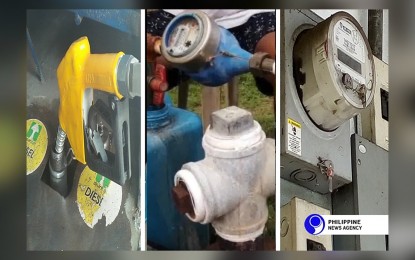[2.7] 2023년 1월 인플레이션 8.7% 달성
컨텐츠 정보
- 17,011 조회
본문
마닐라 – 2023년 1월 국가의 헤드라인 인플레이션율은 2022년 12월 8.1%에서 8.7%로 증가했다고 필리핀 통계청(PSA) 차관 "데니스 마파"가 화요일에 보고했습니다.
마파는 올해 1월 상품·서비스 물가상승률도 2022년 1월 물가상승률 3%보다 높다고 밝혔다.
그는 지난 달 인플레이션의 주요 동인은 주택, 물, 전기, 가스 및 기타 연료였으며 인플레이션은 8.5%였으며 1월 인플레이션 상승세에 50.8%를 기여했다고 말했습니다.
“주택, 수도, 전기, 가스 및 기타 연료 중에서 가장 비중이 큰 항목은 임대, 주택임대입니다. 1월 경제개방 때문에 요금을 조정한 것 같다”고 영어와 필리핀어를 섞어 덧붙였다.
"마파"는 대유행이 한창이던 지난 3년 동안 임대료가 안정적이어서 2020년 2.5%, 2021년 1.3%, 2022년 2.5%의 인플레이션을 기록했다고 말했습니다.
그는 수도 요금과 전기 요금의 상향 조정이 지난 달 가격 인상을 가속화하는 데 기여했다고 말했습니다.
식품 및 무알코올 음료의 가격 인상도 2023년 초 높은 인플레이션을 공유했습니다. 우유, 기타 유제품 및 계란; 과일과 견과류.
2023년 1월 인플레이션에 세 번째로 큰 기여를 한 것은 레스토랑과 숙박 서비스입니다.
1월에 가격이 더 빠르게 상승한 품목은 대부분 과일과 견과류를 중심으로 식품 바구니에서 나왔습니다. 채소, 덩이줄기 등; 설탕, 제과 및 디저트.
반면 지난달 인플레이션이 둔화된 품목에는 쌀이 포함됩니다. 밀가루와 빵; 오일 및 지방; 기성품 및 기타 식품.
지난 달 수도권(NCR)의 인플레이션은 8.6%인 반면 수도권(AONCR) 외부 지역은 8.7%였습니다.
1월 NCR과 AONCR의 인플레이션에 가장 크게 기여한 것은 여전히 주택, 물, 전기, 가스 및 기타 연료입니다.
"Mapa"는 Western Visayas가 1월에 10.3%로 가장 높은 인플레이션을 보고했다고 말했습니다.
정부는 올해 물가상승률을 2.5~4.5% 이내로 잡고 있다.
올해 초 높은 인플레이션에도 불구하고 "Mapa"는 물가 상승을 늦추는 계획이 정부가 인플레이션 목표를 달성하는 데 도움이 될 것이라고 말했습니다. (PNA)
This is the Original Article from PNA NEWS
[2.7] January 2023 inflation hits 8.7%
MANILA – The country’s headline inflation rate in January 2023 increased to 8.7 percent from 8.1 percent in December 2022, Philippine Statistics Authority (PSA) Undersecretary "Dennis Mapa" reported on Tuesday.
"Mapa" said the rate of price increments of goods and services in January this year is also higher than the 3 percent inflation in January 2022.
He said the main driver of inflation last month was housing, water, electricity, gas and other fuels, with inflation of 8.5 percent, and contributing 50.8 percent to the uptrend in January inflation.
“The largest item that has the biggest weight in housing, water, electricity, gas and other fuels is the rental, housing rental. Because of the opening up of the economy, (in) January, I think they have adjusted the rates,” he added in mixed English and Filipino.
"Mapa" said rental rates in the past three years during the height of the pandemic have been stable, with inflation of 2.5 percent in 2020, 1.3 percent in 2021 and 2.5 percent in 2022.
He said the upward adjustments in water tariff and electricity rates have contributed to the acceleration of price increases in the previous month.
Increasing prices of food and non-alcoholic beverages also shared to the higher inflation at the start of 2023, which is driven by more expensive prices of vegetables, tubers and the likes; milk, other dairy products and eggs; and fruits and nuts.
The third largest contributor to inflation in January 2023 is restaurants and accommodation services.
Items with faster increase in prices in January were mostly from the food basket, led by fruits and nuts; vegetables, tubers, and the likes; and sugar, confectionery and desserts.
On the other hand, items that had slower inflation last month include rice; flour and bread; oils and fats; and ready-made food and other food products.
Inflation in the National Capital Region (NCR) was at 8.6 percent, while in areas outside NCR (AONCR) was at 8.7 percent last month.
The biggest contributor to inflation in both NCR and AONCR in January is still housing, water, electricity, gas and other fuels.
"Mapa" said Western Visayas reported the highest inflation in January at 10.3 percent.
The government targets inflation to settle within 2.5 to 4.5 percent this year.
Despite the high inflation at the start of the year, "Mapa" said initiatives to slow down price increases will help the government to achieve its inflation target. (PNA)
관련자료
-
이전
-
다음


